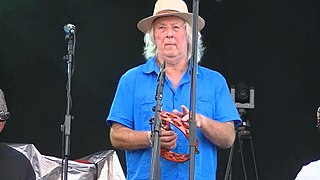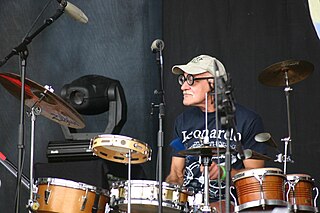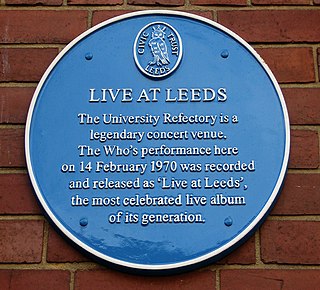
Jethro Tull are a British rock band formed in Blackpool, Lancashire in 1967. Initially playing blues rock and jazz fusion, the band soon incorporated elements of English folk music, hard rock and classical music, forging a signature progressive rock sound. The group's founder, bandleader, principal composer, lead vocalist, and only constant member is Ian Anderson, a multi-instrumentalist who mainly plays flute and acoustic guitar. The group has featured a succession of musicians throughout the decades, including significant contributors such as guitarists Mick Abrahams and Martin Barre ; bassists Glenn Cornick, Jeffrey Hammond, John Glascock, Dave Pegg, Jonathan Noyce, and David Goodier; drummers Clive Bunker, Barrie "Barriemore" Barlow and Doane Perry; and keyboardists John Evan, Dee Palmer, Peter-John Vettese, Andrew Giddings, and John O'Hara.

Ian Scott Anderson is a British musician best known for his work as the singer, flautist, acoustic guitarist, primary songwriter, and sole continuous member of the rock band Jethro Tull. He is a multi-instrumentalist who also plays harmonica, keyboards, bass guitar, bouzouki, balalaika, saxophone and a variety of whistles. His solo work began with Walk into Light in 1983; since then he has released another five albums, including the sequel to the 1972 Jethro Tull album Thick as a Brick, titled TaaB 2: Whatever Happened to Gerald Bostock? (2012).

PRS for Music Limited is a British music copyright collective, made up of two collection societies: the Mechanical-Copyright Protection Society (MCPS) and the Performing Right Society (PRS). It undertakes collective rights management for musical works on behalf of its 175,000 members. PRS for Music was formed in 1997 following the MCPS-PRS Alliance. In 2009, PRS and MCPS-PRS Alliance realigned their brands and became PRS for Music.

Edwin Jobson is an English musician noted for his use of synthesizers. He has been a member of several progressive rock bands, including Curved Air, Roxy Music, U.K. and Jethro Tull. He was also part of Frank Zappa's band in 1976–77. Aside from his keyboard work Jobson has also gained acclaim for his violin playing. He won the Lifetime Achievement Award at the 2017 Progressive Music Awards. In March 2019 Jobson was inducted into the Rock and Roll Hall of Fame as a member of Roxy Music.
Barrie "Barriemore" Barlow is an English musician, best known as the drummer and percussionist for the rock band Jethro Tull, from May 1971 to June 1980.

The Roundhouse is a performing arts and concert venue at the Grade II* listed former railway engine shed in Chalk Farm, London, England. The building was erected in 1846–1847 by the London & North Western Railway as a roundhouse, a circular building containing a railway turntable, but was used for that purpose for only about a decade. After being used as a warehouse for a number of years, the building fell into disuse just before World War II. It was first made a listed building in 1954.

Koko is a concert venue and former theatre in Camden Town, London.

Gerald Conway was an English folk and rock drummer and percussionist. He performed with the backing band for Cat Stevens in the 1970s, with Jethro Tull during the 1980s, and was a member of Fairport Convention from 1998 to 2022. Conway also worked as a session musician. He was married to vocalist Jacqui McShee, the singer of the band Pentangle, of which he was also a member.
Antony "Tony" Moore is an English singer-songwriter, musician, radio presenter and music promoter. He was a member of Iron Maiden in the late 1970s prior to the release of their first album. In 1986 he was the keyboard player with the band Cutting Crew, appearing on their hit single "I Just Died in Your Arms Tonight," and founded The Kashmir Klub in 1997 to showcase live music in London.

The Leadmill is the longest running live music venue and nightclub in Sheffield, in the county of South Yorkshire, England, based on Leadmill Road, lying on the southeast edge of the city centre. It opened in 1980 in a former flour mill, originally a Community Centre.

Clive William Bunker is a British drummer. Bunker is best known as the original drummer of the rock band Jethro Tull, playing in the band from 1967 until 1971. Never a self-professed technical drummer, Bunker engaged with the essence of blues and rock and roll, influenced by Ginger Baker and Mitch Mitchell. He was also inspired by Buddy Rich and The Hollies' Bobby Elliott.

Glenn Douglas Barnard Cornick was an English bass guitarist, best known as the original bassist for the British rock band Jethro Tull from 1967 to 1970. Rolling Stone has called his playing with Tull as "stout, nimble underpinning, the vital half of a blues-ribbed, jazz-fluent rhythm section".

This is the discography of the British progressive rock band Jethro Tull who formed in Luton, Bedfordshire in 1967. Initially playing blues rock, the band's sound soon incorporated elements of British folk music and hard rock to forge a progressive rock signature. The band were led by vocalist/flautist/guitarist Ian Anderson, and have included other significant members such as guitarist Martin Barre, drummer Doane Perry, and bassist Dave Pegg.
Anthony Williams is an English musician who played bass guitar in the folk rock/rock band Stealers Wheel and who also played with Jethro Tull.

The Engineering Heritage Awards, formally known as the Engineering Heritage Hallmark Scheme, were established by the Institution of Mechanical Engineers (IMechE) in 1984 to identify and promote artefacts, locations, collections and landmarks of significant engineering importance.

The University of Leeds Refectory is a 2,100-capacity music venue located on the University of Leeds main campus in Leeds, West Yorkshire, England.
This is a summary of the year 2014 in British music.
Nubian Jak Community Trust (NJCT) is a commemorative plaque and sculpture scheme founded by Jak Beula that highlights the historic contributions of Black and minority ethnic people in Britain. The first NJCT heritage plaque, honouring Bob Marley, was unveiled in 2006 after "two years of research and behind the scenes negotiating". The scheme has been run and managed by the not-for-profit organization Nubian Jak Trust Ltd since August 2016, with a remit to commemorate and celebrate the diverse history of modern Britain. Its objectives include the promotion of social equality and to encourage activities that promote cultural diversity in society.

The Hare & Hounds is a public house and music venue on the High Street in the Kings Heath area of Birmingham, England. Originally built in 1820 and remodelled to its current form in 1907, the Hare & Hounds is Grade II listed, as it retains many original Art Nouveau internal fixtures.














